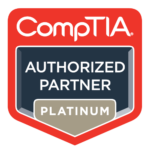CompTIA Security+
Standard 5-Day Training Course (Enter EARLY10 for 10% off!)
In the Standard 5-Day CompTIA Security+ Certification Course, you will build on your knowledge and professional experience with CompTIA certification fundamentals, networks, and organizational CompTIA security training as you acquire the specific skills required to implement basic security services on any type of computer network. The course prepares students for CompTIA Security+ exam and includes an exam voucher.
Extended 10-Day Training Course (Enter EARLY250 for $250 Off!)
We are now offering an Extended 10-Day course option! Gain a deeper understanding of the course concepts and increase your preparedness for the exam at the end of the course by choosing the longer course.
How Our CompTIA Security+ Training Benefits You:
- It will prepare you for the CompTIA Security+ (Exam SY0-701) Certification examination
- The CompTIA certification also provides you with the demonstrable skills required in today’s job market
- This CompTIA certification class meets the requirements for IAT Level 2 and IAM Level 1 in the DoD Directive 8570
CompTIA Security+ Certification Prerequisites
CompTIA A+ and Network+ certifications, or equivalent knowledge / experience.
Who Should Enroll In Security+ Certification Training?
The Extended 10-Day CompTIA Security+ Training Course is ideal for individuals who are new to the field of networking or have limited prior knowledge and want additional time to grasp the foundational concepts. The Standard 5-Day option is great for individuals with some previous exposure to concepts in cybersecurity.
The CompTIA Security+ course provides the required skills to install and configure systems to secure applications, networks, and devices; perform threat analysis and respond with appropriate mitigation techniques; participate in risk mitigation activities; and operate with an awareness of applicable policies, laws, and regulations. These roles greatly benefit:
- Systems Administrators
- Network Administrators
- Security Administrators
- Specialists
- Engineers
Schedule
Standard 5-Day Training Course (Enter EARLY10 for 10% off!)
Extended 10-Day Training Course (Enter EARLY250 for $250 Off!)
CompTIA Security+ Certification & Training Resources
- How To Get A Security+ Certification

- What Is Security+ (Plus)?

- The CompTIA Security+ Certification Explained

- #1 Reason Candidates Fail The CompTIA Security+ Exam (And How You Can Pass)

Credentialing Assistance Information
| Course Cost | $1,891 |
| Exam Cost | $404 |
This course includes:
- 5 Full Days of Instructor Led CompTIA Authorized Training
- CertMaster Learn (12 month access)
- CertMaster Labs (12 month access)
- CertMaster Practice (12 month access)
- CompTIA Authorized Security+ eBook (Unlimited Access)
- Security+ Instructor Slides
- Office hours with certified CompTIA Instructors
- Detailed Reporting on Course Progress and Exam Readiness
- 1 Exam Voucher (Valid for 12 months)
- Free Class Repeat for 12 months (Space Available Basis)
- Certificate of Completion for up to 40 CEUs/CPEs
CompTIA Security+ (SY0-701) Course Outline
Lesson 1: Summarize Fundamental Security Concepts
Topic 1A: Security Concepts
Topic 1B: Security Controls
Lesson 2: Compare Threat Types
Topic 2A: Threat Actors
Topic 2B: Attack Surfaces
Topic 2C: Social Engineering
Lesson 3: Explain Cryptographic Solutions
Topic 3A: Cryptographic Algorithms
Topic 3B: Public Key Infrastructure
Topic 3C: Cryptographic Solutions
Lesson 4: Implement Identity and Access Management
Topic 4A: Authentication
Topic 4B: Authorization
Topic 4C: Identity Management
Lesson 5: Secure Enterprise Network Architecture
Topic 5A: Enterprise Network Architecture
Topic 5B: Network Security Appliances
Topic 5C: Secure Communications
Lesson 6: Secure Cloud Network Architecture
Topic 6A: Cloud Infrastructure
Topic 6B: Embedded Systems and Zero Trust Architecture
Lesson 7: Explain Resiliency and Site Security Concepts
Topic 7A: Asset Management
Topic 7B: Redundancy Strategies
Topic 7C: Physical Security
Lesson 8: Explain Vulnerability Management
Topic 8A: Device and OS Vulnerabilities
Topic 8B: Application and Cloud Vulnerabilities
Topic 8C: Vulnerability Identification Methods
Topic 8D: Vulnerability Analysis and Remediation
Lesson 9: Evaluate Network Security Capabilities
Topic 9A: Network Security Baselines
Topic 9B: Network Security Capability Enhancement
Lesson 10: Assess Endpoint Security Capabilities
Topic 10A: Implement Endpoint Security
Topic 10B: Mobile Device Hardening
Lesson 11: Enhance Application Security Capabilities
Topic 11A: Application Protocol Security Baselines
Topic 11B: Cloud and Web Application Security Concepts
Lesson 12: Explain Incident Response and Monitoring Concepts
Topic 12A: Incident Response
Topic 12B: Digital Forensics
Topic 12C: Data Sources
Topic 12D: Alerting and Monitoring Tools
Lesson 13: Analyze Indicators of Malicious Activity
Topic 13A: Malware Attack Indicators
Topic 13B: Physical and Network Attack Indicators
Topic 13C: Application Attack Indicators
Lesson 14: Summarize Security Governance Concepts
Topic 14A: Policies, Standards, and Procedures
Topic 14B: Change Management
Topic 14C: Automation and Orchestration
Lesson 15: Explain Risk Management Processes
Topic 15A: Risk Management Processes and Concepts
Topic 15B: Vendor Management Concepts
Topic 15C: Audits and Assessments
Lesson 16: Summarize Data Protection and Compliance
Topic 16A: Data Classification and Compliance
Topic 16B: Personnel Policies
Is there a discount available for current students?
UMBC students and alumni, as well as students who have previously taken a public training course with UMBC Training Centers are eligible for a 10% discount, capped at $250. Please provide a copy of your UMBC student ID or an unofficial transcript or the name of the UMBC Training Centers course you have completed. Asynchronous courses are excluded from this offer.
What is the cancellation and refund policy?
Student will receive a refund of paid registration fees only if UMBC Training Centers receives a notice of cancellation at least 10 business days prior to the class start date for classes or the exam date for exams.

